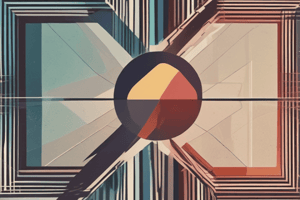Podcast
Questions and Answers
What does an open composition convey?
What does an open composition convey?
- A sense of balance or stability
- A sense of freedom or vastness (correct)
- A sense of chaos or disorder
- A sense of confinement or constraint
What can be suggested by one form overlapping another?
What can be suggested by one form overlapping another?
- The texture of the objects
- Depth and the relative position of objects (correct)
- The color of the objects
- The shape of the objects
What technique involves using subtle gradations in color and tone to depict distance?
What technique involves using subtle gradations in color and tone to depict distance?
- Implied movement
- Atmospheric perspective (correct)
- Positive space
- Negative space
What refers to the empty or non-object areas within a composition?
What refers to the empty or non-object areas within a composition?
Why is the balance of negative and positive space important in a composition?
Why is the balance of negative and positive space important in a composition?
What is one of the key elements that contribute to the impact of an artwork?
What is one of the key elements that contribute to the impact of an artwork?
What technique is used to create the illusion of space in a two-dimensional artwork?
What technique is used to create the illusion of space in a two-dimensional artwork?
How can movement be suggested in a static artwork?
How can movement be suggested in a static artwork?
What can implied movement create within an artwork?
What can implied movement create within an artwork?
What is the effect of larger objects in a composition?
What is the effect of larger objects in a composition?
What can be achieved by understanding how artists manipulate space within their compositions?
What can be achieved by understanding how artists manipulate space within their compositions?
What type of composition typically includes empty or negative spaces?
What type of composition typically includes empty or negative spaces?
What is the purpose of analyzing the use of perspective in an artwork?
What is the purpose of analyzing the use of perspective in an artwork?
What is the effect of smaller objects in a composition?
What is the effect of smaller objects in a composition?
What is the role of spatial relationships in an artwork?
What is the role of spatial relationships in an artwork?
What is the difference between open and closed compositions?
What is the difference between open and closed compositions?
Flashcards are hidden until you start studying
Study Notes
Understanding Spatial Relationships in Artworks
- Artistic representations evoke emotions, convey messages, and capture the imagination of viewers, and spatial relationships are a key element in achieving this impact.
Perspective and Depth
- Artists create the illusion of space in a 2D artwork using perspective techniques.
- Linear perspective involves converging lines receding into the distance, creating a 3D space perception.
- Analyzing perspective helps understand the artist's intentions and object relationships.
Proportions and Scale
- Objects' size and scale contribute to spatial relationships interpretation.
- Larger objects tend to appear closer, while smaller objects recede into the background.
- Analyzing proportions reveals the hierarchical relationships the artist intended to convey.
Open and Closed Composition
- Artworks can be categorized as open or closed compositions based on space utilization.
- Open composition includes empty or negative spaces, conveying freedom or vastness.
- Closed composition fills the entire picture plane, implying confinement or constraint.
Overlapping and Intersecting Forms
- Artists use overlapping and intersecting forms to create spatial relationships between objects.
- Overlapping forms suggest depth and provide cues about object positions.
- Intersecting forms create a sense of interaction or connection between elements.
Atmospheric Perspective and Fading
- Atmospheric perspective involves subtle gradations in color and tone to depict distance and depth.
- Objects recede into the background, becoming less defined, lighter in color, and sometimes blurrier.
- This technique mimics natural light scattering, giving an illusion of depth.
Negative and Positive Space
- Negative space refers to empty or non-object areas in a composition.
- Positive space represents the objects or subjects themselves.
- The balance and relationships between negative and positive space influence the interpretation of an artwork.
Implied Movement and Gestures
- Artists suggest movement through strategic placement and gestures of figures or objects.
- Implied movement creates a sense of energy, flow, or tension within the artwork.
- Analyzing gestures and placement reveals spatial relationships and narratives.
Studying That Suits You
Use AI to generate personalized quizzes and flashcards to suit your learning preferences.




